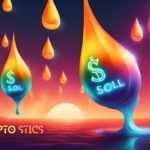What is an NFT?
Non-fungible tokens (NFTs) are digital assets that are unique and cannot be replaced. They are stored on a blockchain, which is a secure and decentralized ledger. NFTs can represent anything, from art to music to collectibles.
Here are some examples of NFTs

- A digital artwork by Beeple sold for $69 million.
- A tweet by Jack Dorsey, the co-founder of Twitter, sold for $2.9 million.
- A CryptoKitty, a digital cat collectible, sold for $100,000.
NFTs are bought and sold using cryptocurrency, such as Ethereum. They can be traded on online marketplaces, such as OpenSea and Rarible.
The value of an NFT is determined by supply and demand. The rarer an NFT is, the more valuable it is. The NFT’s community can also affect its value. If an NFT has a strong community of supporters, it is more likely to appreciate in value.
There are many reasons why people buy NFTs. Some people buy them because they believe in the technology. Others buy them because they are interested in the art or collectibles. Still, others buy them as an investment.
NFTs are a new and emerging technology, and it is still too early to say what their long-term impact will be. However, they have the potential to revolutionize the way we own and trade digital assets.
Overall, Right NFT is a new and exciting technology with the potential to revolutionize the way we own and trade digital assets. However, there are also some risks associated with NFTs, so it is important to do your research before investing.
Non-fungible tokens (NFTs) are digital assets that are unique and cannot be replaced. They are stored on a blockchain, which is a secure and decentralized ledger
Non-fungible tokens (NFTs)
Non-fungible tokens (NFTs) are digital assets that are unique and cannot be replaced. They are stored on a blockchain, which is a secure and decentralized ledger. NFTs can represent anything, from art to music to collectibles.
What makes an NFT unique?
The uniqueness of an NFT is determined by its metadata. Metadata is data that describes other data. In the case of an NFT, the metadata includes information such as the NFT’s creator, the date it was created, and its unique identifier.
How are NFTs stored?
NFTs are stored on a blockchain, which is a secure and decentralized ledger. A blockchain is a distributed database that is shared among a network of computers. This makes it very difficult to hack or tamper with NFTs.
What are the benefits of NFTs
There are several benefits to using NFTs. First, they provide a way to own digital assets that are unique and cannot be copied. Second, they can be used to prove ownership of digital assets. Third, they can be used to create a marketplace for digital assets. Fourth, they can be used to create a new way to collect and trade digital assets.
What are the risks associated with NFTs
There are also some risks associated with NFTs. First, they are a new and emerging technology, so there is a risk of fraud. Second, they are still not widely accepted, so it can be difficult to find buyers and sellers. Third, the value of NFTs can be volatile, so there is a risk of losing money.
If you are considering investing in NFTs, it is important to do your research and understand the risks involved. You should also consult with a financial advisor to get personalized advice.
Factors to Consider When Choosing an NFT
Non-fungible tokens (NFTs) are digital assets that are unique and cannot be replaced. They are stored on a blockchain, which is a secure and decentralized ledger. NFTs can represent anything, from art to music to collectibles.
When choosing an NFT, there are a few factors you should consider

Your budget
NFTs can range in price from a few dollars to millions of dollars. It is important to set a budget before you start shopping. If you are on a tight budget, you may want to consider buying NFTs that are less rare or that do not have a strong community.
Your interests
What kind of NFTs are you interested in? Are you interested in art, music, collectibles, or something else? It is important to choose NFTs that you are interested in and that you think will appreciate in value.
Your investment goals
Are you buying an NFT to collect, to use, or to invest? If you are buying an NFT to collect, you may want to choose NFTs that you find aesthetically pleasing or that have sentimental value to you. If you are buying an NFT to use, you may want to choose NFTs that have utility, such as gaming NFTs or NFTs that give you access to exclusive content. If you are buying an NFT to invest in, you may want to choose NFTs that are rare or that have a strong community.
The NFT’s rarity
The rarer an NFT is, the more valuable it is. However, rarity is not the only factor that determines an NFT’s value. Other factors, such as the NFT’s community and its future potential, can also be important.
The NFT’s community
Does the NFT have a strong community of supporters? A strong community can help to increase the value of an NFT. NFTs with a strong community are more likely to be traded and resold, which can drive up their value.
The NFT’s future potential
Do you think the NFT has the potential to appreciate in value? This is a more speculative factor, but it can be important if you are considering investing in an NFT. NFTs that are backed by strong projects or that have the potential to be used in new and innovative ways are more likely to appreciate value.
It is also important to do your research before buying the right NFT. This includes learning about the NFT, its creator, and its community. You should also buy from a reputable marketplace that has a good reputation.
Choosing the right NFT can be a daunting task, but it is important to do your research and consider all of the factors involved. By following these tips, you can increase your chances of choosing the right NFT for you.
How to Buy an NFT

Non-fungible tokens (NFTs) are digital assets that are unique and cannot be replaced. They are stored on a blockchain, which is a secure and decentralized ledger. NFTs can represent anything, from art to music to collectibles.
If you are interested in buying an NFT, here are the steps you need to follow:
Choose an NFT marketplace
There are many NFT marketplaces available, such as OpenSea, Rarible, and Foundation. Choose a marketplace that has the NFTs you are interested in and that has a good reputation.
Create a digital wallet
You will need a digital wallet to store your NFTs. There are many different digital wallets available, such as MetaMask and Coinbase Wallet. Choose a wallet that supports the blockchain network that the NFTs you are interested in are on.
Fund your digital wallet
You will need to fund your digital wallet with cryptocurrency, such as Ethereum. The amount of cryptocurrency you need will depend on the price of the NFTs you are interested in.
Find the NFT you want to buy
Browse the NFT marketplace and find the NFT you want to buy. Make sure to read the NFT’s description carefully and to research the NFT’s creator and its community.
Make an offer
Once you have found the right NFT you want to buy, you can make an offer. The offer price is the amount of cryptocurrency you are willing to pay for the NFT.
Complete the purchase
If your offer is accepted, you will need to complete the purchase. This will involve transferring the cryptocurrency from your digital wallet to the seller’s digital wallet.
Once you have purchased a Right NFT, it will be stored in your digital wallet. You can then view, sell, or trade your NFT as you please.
How to Protect Your NFTs

In the ever-evolving landscape of digital assets, non-fungible tokens (NFTs) have emerged as a revolutionary concept. These unique, blockchain-based tokens represent ownership of digital assets, whether it’s digital art, collectibles, virtual real estate, or even tweets. With the meteoric rise of NFTs, it’s crucial to understand how to protect your investments. In this blog post, we’ll discuss some essential steps to safeguard your NFTs.
1. Keep Your NFTs in a Secure Wallet
The foundation of NFT security lies in the wallet you choose. NFTs are typically stored in cryptocurrency wallets, and you have two main options: hot wallets and cold wallets.
Hot Wallets
These wallets are connected to the internet and are convenient for quick access to your NFTs. However, they are also more vulnerable to hacking attempts. If you opt for a hot wallet, make sure to use a reputable and well-secured one. Always keep it updated with the latest security features.
Cold Wallets
Cold wallets, on the other hand, are offline storage devices, like hardware wallets or paper wallets. They offer a higher level of security as they are not connected to the internet, making it extremely difficult for hackers to access your assets. If you’re holding valuable NFTs, consider transferring them to a cold wallet for added protection.
2. Do Not Share Your Wallet’s Private Key
Your wallet’s private key is the digital key to your NFT kingdom. It’s the most sensitive piece of information, and under no circumstances should you share it with anyone. Phishing attempts, scams, and malicious actors are always on the prowl, looking to exploit vulnerabilities. Always remember:
- Never share your private key in emails, messages, or on social media.
- Be wary of suspicious websites or apps asking for your private key.
- Keep your private key offline, preferably on a physical device, like a hardware wallet.
3. Back Up Your Wallet Regularly
Losing access to your wallet is a nightmare scenario for NFT holders. This can happen due to a variety of reasons, such as hardware failure, loss, or damage. To prevent losing your valuable NFTs, regular backups are essential.
- If you use a hardware wallet, follow the manufacturer’s instructions on creating a backup or recovery phrase. This phrase allows you to restore your wallet and access your NFTs if the device is lost or damaged.
- For hot wallets, ensure you have secure and redundant backups of your private keys and recovery phrases. Store these backups in separate, secure locations, preferably offline.
Bonus Tip: Stay Informed and Be Cautious
In the world of NFTs, vigilance is your best friend. Stay informed about the latest security threats and best practices. Follow reputable NFT communities and forums to keep up-to-date with security news and potential scams. Be cautious when interacting with NFT marketplaces, artists, and fellow collectors. Remember that, like any investment, NFTs carry risks, and it’s essential to conduct due diligence.
In conclusion, the world of NFTs is an exciting one, filled with opportunities and risks. Protecting your NFT investments is paramount. Start by choosing a secure wallet, safeguarding your private key, and regularly backing up your wallet. By following these steps and staying informed, you can enjoy your NFT journey with peace of mind, knowing that your digital treasures are safe and sound.
Conclusion
In conclusion, selecting the right NFT (Non-Fungible Token) for your needs is a crucial decision in the rapidly evolving world of digital assets. This guide has outlined several key considerations to help you make an informed choice. Remember to start by defining your purpose and goals, whether it’s collecting, investing, supporting artists, or participating in virtual communities. Assess the authenticity and value of the NFT by researching the creator, the project’s history, and the underlying blockchain technology. Evaluate the scarcity, utility, and potential for long-term demand of the NFT in question. Consider the environmental impact and ethical implications associated with the blockchain network it operates on. Finally, stay informed about market trends and developments to adapt your NFT portfolio over time.
Ultimately, the right NFT for you should align with your objectives, values, and interests. By applying these guidelines and staying vigilant in your research, you can navigate the NFT space with confidence and make choices that best suit your unique preferences and aspirations. As the NFT ecosystem continues to evolve, remember that your decisions today can shape your digital asset journey for years to come.
Disclaimer
Information published on Crypto Stics is not meant to be taken as financial counsel. Investors should carry out their own research before making any high-risk investments in Bitcoin, cryptocurrencies, or digital assets. Please be advised that all transfers and transactions are done at the user’s own risk, and the user is liable for any losses the user may incur. Crypto Stics does not provide investment advice and does not recommend buying or selling any cryptocurrencies or other digital assets. We are here to let you know that Crypto Stics uses affiliate marketing.









